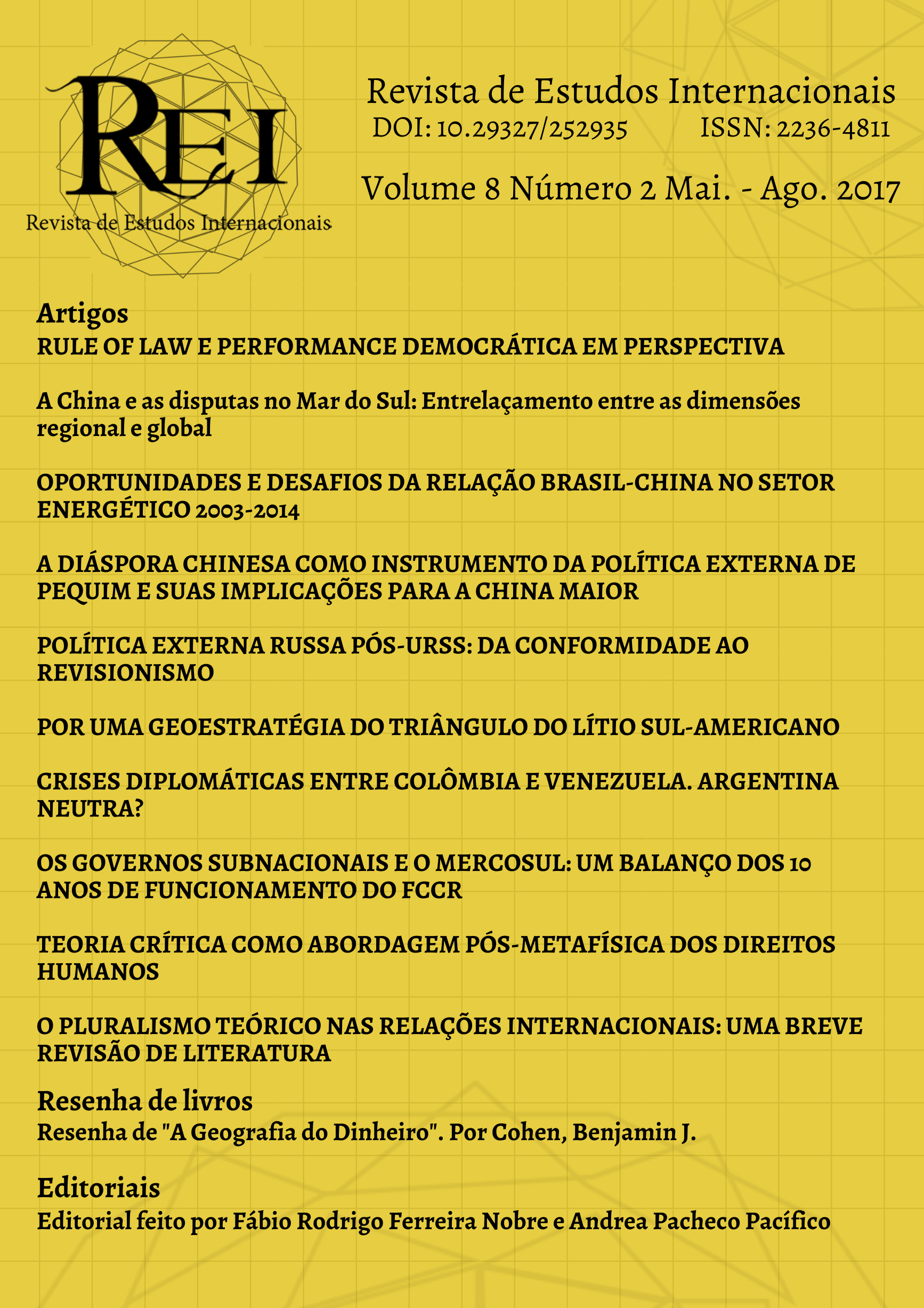O PLURALISMO TEÓRICO NAS RELAÇÕES INTERNACIONAIS: UMA BREVE REVISÃO DE LITERATURA
Palavras-chave:
Pluralismo Teórico, Teoria de Relações Internacionais, Racionalismo, ConstrutivismoResumo
Este artigo tem como principal objetivo incluir nas discussões sobre teoria de Relações Internacionais da academia brasileira o tema do pluralismo teórico. O debate aqui apresentado não se alinha aos argumentos de autores como Dunne, Hansen e Wight (2013), que consideram como pluralismo a diversidade de teorias presentes na literatura sobre relações internacionais. Aqui, entende-se por pluralismo teórico o esforço para conjugar perspectivas de diferentes abordagens teóricas das Relações Internacionais, buscando uma explicação mais contundente da realidade vigente no Sistema Internacional. Portanto, pretendemos apresentar uma breve revisão de literatura sobre o pluralismo teórico nas RI, a partir de uma análise das pesquisas dos principais estudiosos do tema. O artigo está dividido em duas seções. Na primeira explanaremos o conceito de pluralismo teórico, o contexto que possibilitou seu desenvolvimento dentro das Relações Internacionais, suas estratégias de aplicação e algumas limitações apresentadas pela literatura sobre esse instrumento. Na seção seguinte, apresentar-se-á uma discussão considerada pelos autores como fundamento para a abordagem pluralista nas Relações Internacionais: o debate entre Racionalismo e Construtivismo.
Referências
ATTINA, Fulvio (1990). The voting behaviour of the European Parliament members and the
problem of the Europarties. European Journal of Political Research, 18 (5): 557-79.
BA, Alice B. (2010). Reflections on Analytic Eclecticism and the Field. Qualitative and MultiMethod Research: Newsletter of the American Political Science Association Organized
Section for Qualitative and Multi-Method Research, 8 (2):14-7.
BENNETT, Andrew (2010). From Analytic Eclecticism to Structured Pluralism. Qualitative and
Multi-Method Research: Newsletter of the American Political Science Association Organized
Section for Qualitative and Multi-Method Research, 8 (2): 6-9.
CHECKEL, Jeffrey T. (2013). Theoretical Pluralism in IR: Possibilities and Limits. In
CARLNAES, W.; RISSE, T.; SIMMONS, Beth A. (ed.). Handbook of International Relations.
London: Sage Publications, 220-42.
DUNNE, Tim; HANSEN, Lene; WIGHT, Colin (2013). The end of International Relations theory?.
European Journal of International Relations, 19 (3):405-25.
FEARON, James; WENDT, Alexander (2002). Rationalism v. constructivism: a skeptical view. In
CARLNAES, W.; RISSE, T.; SIMMONS, Beth A. (ed.). Handbook of International Relations.
London: Sage Publications, 52-72
GUZZINI, Stefano (2013). The ends of International Relations theory: Stages of reflexivity and
modes of theorizing. European Journal of International Relations, 19 (3): 521-41.
HAAS, Ernst B. (1976). Turbulent fields and the theory of regional integration. International
Organization, 30 (2):173-212.
HAAS, Peter M. (2010). Practicing Analytic Eclecticism. Qualitative and Multi-Method
Research: Newsletter of the American Political Science Association Organized Section for
Qualitative and Multi-Method Research, 8 (2):9-14.
JUPILLE, Joseph; CAPORASO, James A.; CHECKEL, Jeffrey T. (2003). Integrating institutions
rationalism, constructivism, and the study of the European Union. Comparative Political Studies,
(1-2): 7-40.
KAHLER, Miles et al. (1998). Rationality in international relations. International Organization,
(4): 919-41.
KATZENSTEIN, Peter J.; KEOHANE, Robert O.; KRASNER, Stephen D. International
organization and the Study of World politics. International Organization, 52 (4): 645-85.
KATZENSTEIN, Peter J.; SIL, Rudra (2010a). Analytic eclecticism in the study of world politics:
Reconfiguring problems and mechanisms across research traditions. Perspectives on Politics, 8 (2):
-31.
______. (2010b). Analytic Eclecticism: Not Perfect, but Indispensable. Qualitative and MultiMethod Research: Newsletter of the American Political Science Association Organized
Section for Qualitative and Multi-Method Research, 8 (2):19–24.
KEOHANE, Robert O.; NYE JR., Joseph (1975). International interdependence and integration. In
GREENSTEIN, F. & POLSBY, N. (ed.). Handbook of Political Science. Reading, MA: AddisonWesley, 363-414.
LAKE, David A. (2011). Why “isms” Are Evil: Theory, Epistemology, and Academic Sects as
Impediments to Understanding and Progress. International Studies Quarterly, 55 (2): 465-480.
______. (2013). Theory is dead, long live theory: The end of the Great Debates and the rise of
eclecticism in International Relations. European Journal of International Relations, 19 (3): 567-
LEGRO, J. W. (1996). Culture and preferences in the international cooperation two-step. American
Political Science Review, 90 (1): 118-37.
MEARSHEIMER, John J.; WALT, Stephen M. (2013). Leaving theory behind: Why simplistic
hypothesis testing is bad for International Relations. European Journal of International
Relations, 19 (3):427-57.
MILNER, Helen V. (1998). Rationalizing politics: The emerging synthesis of international,
American and comparative politics. International Organization, 52 (4):759-86.
MORAVCSIK, Andrew (1991). Negotiating the Single European Act: national interests and
conventional statecraft in the European Community. International organization, 45 (1): 19-56.
______. (1993). Preferences and power in the European Community: a liberal intergovernmentalist
approach. JCMS: Journal of Common Market Studies, 31(4): 473-524.
ROCHA, Antônio Jorge Ramalho (2002). Relações Internacionais: teorias e agendas. Brasília:
IBRI.
TAYLOR, Rosemary C. R. And HALL, Peter A (1996) Political Science and the Three New
Institutionalism, publicado em [http://www.mpifg.de/pu/mpifg_dp/dp96-6.pdf]. Disponibilidade:
/07/2016


